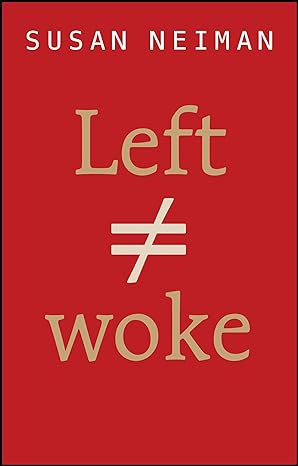- Books
- 20 de May de 2024
- No Comment
- 8 minutes read
Left is not woke

Left is not woke
This book is a must-read for anyone who identifies as sincerely left


Susan Neiman: Left is not woke
There are books that, when you see them on the novelty tables, say “take me” and there’s nothing else to do. In this case, I found a tower of 25 copies of Left is not woke by Susan Neiman at the FNAC. I immediately knew that this was something very relevant and the essay did not disappoint.
Neiman’s proposal echoes the philosophies of Markus Gabriel and Marina Garcés: we must return to the path of the Enlightenment before political turmoil blurs our vision. But what does it mean to “return to the Enlightenment” beyond a mere slogan? First of all, it means rejecting the notion that all human life is subject to irrational imperatives and the logic of power. If we lose faith in our adult capacity for analysis and collective problem-solving, we will not be on the path of Hume, Kant or Morelly. Secondly, we need to immediately recover the notion of “universalism”. Universalism is not the reduction to an imperialist reason of all ways of life, but rather a militant recognition that all ways of life deserve respect and encouragement, except the irrationalist ones. Democratic reason despite its potential for abuse and falsity, is correctable and perfectible; unreason is always authoritarian, personalistic, depressing and rewards the cruelty of the most violent.
Those most fearful of being labelled “woke” often retaliate against their accusers, arguing that the term was initially weaponized by right-wing extremists to undermine left-wing activists. Susan Neiman demonstrates the falsity of this claim, showing that the term dates back to the 1930s and was originally a compliment for those distinguished by their anti-racism.
The second very interesting thing that Susan Neiman, director of the Einstein Forum in Potsdam, does is to dive into the philosophy of Wokism to understand the origins of the hysterical and irrational gestures that have pervaded the materialist left in the West. She traces those sources in the philosophy of Michel Foucault, clarifying that Foucault was not a progressive author but one opposed to notions of progress and universalism. The evidence she presents is undeniable.
If one thing is clear In Foucault’s books, it is that a source of power emanates from all public discourse, and his fundamental discovery was that power surrounds us and shapes us, and we can only respond to the aggressions of power with power. So far, no objection. However, if absolutely everything we think, say and transmit is power, is there no way to mitigate that power, or to base our actions on more rational and supportive attitudes? If it is really impossible to organise ourselves according to universal ethical parameters, we might as well give up hope and cease trying to know, teach and perfect our frameworks for coexisting. This terribly pessimistic conclusion benefits our most cynical and irresponsible rulers and leaders, who are precisely the most optimistic ones. Where nothing is worth anything, anything goes, and so we see them, our elected leaders, splashing about in their pathetic swamps, with no one demanding explanations from them, with no one holding them accountable for their hypocrisy and cynicism. It is their hour of paradise: if they tear away our instruments of social analysis, the victory of extractive chaos is certain.
Neiman’s key moment in the book is her analysis of Foucault’s sources and his radical critique of the Enlightenment and the liberal world, rooted in the works of Martin Heidegger and jurist Carl Schmitt. Foucault’s critique, based on arguments from reactionaries and anti-modernists, is deeply problematic.
Returning to the Enlightenment means just that: limiting power and placing rational constraints around it. In today’s world, every minority and identity group feel entitled to overpower others, leading to a culture of domination without negotiation, coexistence, or tolerance. Because the change in the last twenty years has been this: from a left that wanted to limit and share power to another false left that demanded power for its own sake, so that we could all step on each other’s toes and run over each other without fear. And it is this anti-universalist ideal that has led us to the ideal of nihilistic social death, death for all, hatred for all and against all. Of course, it is so difficult, sometimes so hard and so poorly rewarded, so expensive, to maintain the discipline of research, to instruct, to persuade, to discuss, to build, that the best thing to do is to kick, insult, throw stones, overthrow, abandon, hate and spit.
The false Wokist revolution, this strange form of civil religion that shortens lives, destroys societies, deforms reality and distrusts history, has its roots in two Nazi thinkers who systematised the illiberal political thought of the 20th century, the same illiberalism causing unrest in Hungary, Poland, Italy, the United States and Germany. Some authors argue that Wokism is a reaction to the fascist tendencies afflicting our civilization. Neiman, however, strongly advises against blaming the victim—democratic dialogical reason—for the attacks it endures from economic monopolists, utilitarian absolutists, and neo-imperialist reactionaries. A hysterical and reactionary left, abandoning the legal foundations of society, leaves the field open for profiteers and tyrants, because it has given up the need for organisation, documentation, to be serious and credible, rational and just, beyond gestures, meme, moment of glory and outburst.
This book is a must-read for anyone who identifies as sincerely left, like Susan Neiman, but feels uncomfortable in populist or reactionary leftist movements that dictate thought, even when agreement is in principle. An enlightened left believes in the adult maturation of individuals and communities, progress through dialogue, and not in the symbolic violence of intellectual militarism. An enlightened person demands to verify the truth or plausibility of what they are told. An enlightened person understands that tolerance, that rare and fragile commodity, can only (and not always) flourish where there is a commitment to humanistic and scientific self-examination. Revenge against reason only leads to more anxiety and despair. Claiming power in an eternal present is not a choice for the future, but a choice for the past, as without rational analysis, all possible futures are cancelled. Stoning, gagging, silencing or lying are not effective tools in the medium term to promote acceptance and preventing violent dehumanisation.
This book is a must-read for anyone who still values reason over shouting, who seeks courageous discourse with courage and not just public figures based on superficial charisma and who desires a genuine commitment to social and material betterment. It is a book that will challenge charlatans and testicular pseudo-revolutionaries, exposing the authoritarianism and individualism of the so-called left awakening. The harsh truths presented by Neiman reveal the underlying primitivism and authoritarianism that isolate individuals and workers, plunging them into Foucauldian reactionary pessimism.
Title: Left is not woke
Author: Susan Neiman
Publisher: Wiley John + Sons
Language: English
Number of pages: 154
Publication date: June 2023
Source: educational EVIDENCE
Rights: Creative Commons


